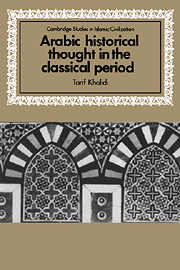Preface
Published online by Cambridge University Press: 23 November 2009
Summary
Historians may be informative in either of two very different ways: for what they may or may not tell us about the past or for what they tell us about thinking about the past. My own interests have for some years now been centred on this latter aspect of historiography – one which, where Arabic-Islamic culture is concerned, has clearly not received the attention it merits. It also seemed to me, when I began to investigate the historiographic corpus, that historians in general do not concern themselves too much with the theoretical dimensions of their work and that the epistemic canopy under which a historian normally shelters is furnished, generally speaking, by the neighbouring social sciences. The ‘data’ or ‘events’ or ‘archive’ which historians for the most part examine come to them already refracted, most often by other historians. That process of refraction dooms most historical writing to be second-hand but is also of course compounded by the fact that historians are themselves conditioned in their manner of receiving, filtering or transmitting the past.
Accordingly, in attempting to trace the development of historical thought in the Arabic-Islamic tradition, it quickly became apparent that the net must be cast wide, to include not only the historians themselves but the various conceptual frameworks within which they operated. Once these epistemic canopies were determined, it was also important to show how these were, in turn, implanted in social and political developments. But even when all these problems became less obscure, there still remained the daunting obstacle of the size of the historiography corpus.
- Type
- Chapter
- Information
- Arabic Historical Thought in the Classical Period , pp. xi - xivPublisher: Cambridge University PressPrint publication year: 1994

